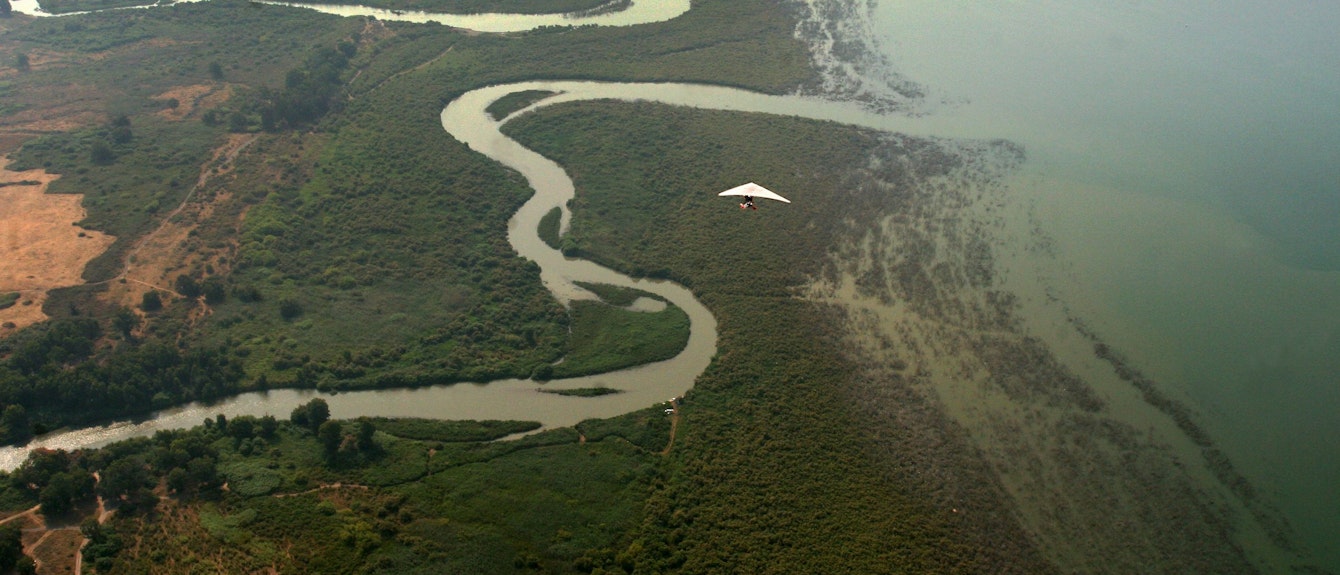
Nature and National Security in the Middle East
The Century Foundation’s new initiative, “Nature and National Security in the Middle East,” aims to show why and how policy makers should incorporate the environment and climate change into all their work. The unfolding environmental emergency affects all areas of policy, and nowhere as acutely as in the Middle East, which is at the leading edge of a global crisis.
With support from the Rockefeller Brothers Fund, the reports and roundtables in this effort lay out a rationale for embedding environmental factors into policy-making across the spectrum, and offer detailed proposals for addressing a range of specific cases in the Middle East. Today’s environmental and climate change concerns in the Middle East will manifest as tomorrow’s crises in other regions as well, as decades of human-driven climate change and environmental degradation exert their impact all over the world.
The nine papers in the series include:
- Bringing the Natural World into America’s Middle East Policy: Averting A Crisis Foretold by Peter Schwartzstein, environmental journalist and consultant. The environmental crisis in the Middle East is severe and it is getting worse, with potentially dramatic security ramifications. Yet the United States is at risk of being caught flat-footed. This opening paper explains why it is time to expand traditional definitions of national security policy to embrace environmental protection and climate action.
- Yemen’s Environmental Crisis is the Biggest Risk for its Future by Helen Lackner, visiting fellow at the European Council for Foreign Relations, and Abulrahman Al-Eryani, former Yemeni minister of water and environment. Hidden behind the headlines about the ongoing bloodshed in Yemen is the fact that the country’s environment is nearing collapse. The authors argue that the causes of the crisis are human, and require help from the United States and the region to correct.
- Saving Gaza Begins with Its Water by Rebhy El-Sheikh, engineer and former Gaza-based deputy head of the Palestinian Water Authority, and Fuad Bateh, former advisor to the former Palestinian water minister. Gaza is suffering an existential crisis at the intersection of water, health, and the environment. A long-term solution is complex, but the authors argue that the international community can make a major investment in stability by immediately securing more water imports to the territory.
- What the World Can Do about the Middle East’s Coming Environmental Crisis by Johan Schaar, associate senior fellow with the Stockholm International Peace Research Institute. In the Middle East and North Africa, the twin problems of degraded natural resources and insecurity reinforce each other in a vicious cycle. In this paper, the author outlines why the international community should stop treating them in isolation.
- Iraq’s Climate Crisis Requires Bold Cooperation by Azzam Alwash, winner of the 2011 Takreem Award and the 2013 Goldman Environmental Prize for his work on the restoration of Iraq’s marshes. Iraq’s water system is on the cusp of bankruptcy. This paper makes the case for a new type of policy making–one that reaches across the old fault lines of mistrust and conflict, and dares to break through old assumptions to reconnect Iraq to its neighbors and the world.
- Middle Eastern Environmentalists Need a Seat at the Table by Hafsa Halawa is a nonresident scholar at the Middle East Institute and consultant. Middle East authoritarians are cracking down on civil society. In this paper, Halawa argues that supporting environmental activists will achieve the double goal of advancing rights and addressing environmental degradation—two of the regions’ most pressing crises.
- Coping with Water Scarcity in the Jordan River Basin by Ram Aviram, a geopolitical consultant for the Israeli Administration for the Rehabilitation of the Lower Jordan River, Ahmad Hindi, former director general of the Palestinian National Water Council Unit in the Palestinian Water Authority, and Saad Abu Hammour, board chairman of Miyahuna (Jordan Water Company) and senior advisor to the Arab Potash Company. The Jordan River—a primary source of water for Jordan, Israel, and the West Bank—is in a state of critical depletion. These three experienced water officials from Israel, Jordan and the Palestinian Authority speak in one voice to outline how this shared problem may lead to shared solutions, which would benefit not only the water sector, but the region’s political climate as well.
- Syria’s Human Security Is Inseparable from Its Environmental Health by Marwa Daoudy, associate professor of international relations at Georgetown University, School of Foreign Service and the Center for Contemporary Arab Studies. The untold story of Syria’s brutal civil war is the deterioration of natural resources and the costs of environmental degradation. Daoudy argues that the human toll of this damage will be yet another Syrian tragedy—unless policymakers address it.
- Roundtable: Keeping the Peace in the Nile Basin featuring contributors Frezer Getachew Haile, an advisor and researcher on Nile hydro-politics and Ethiopia, Timothy E. Kaldas, a nonresident fellow at the Tahrir Institute for Middle East Policy, and Peter Schwartzstein, environmental journalist and consultant. At odds over a Nile dam, Egypt and Ethiopia have been mired in dispute for almost a decade. Although the clash has lost some of its initial bite, myriad problems remain—but, as the roundtable contributors discuss, there are also opportunities for new and productive approaches.
Bringing the Natural World into America’s Middle East Policy: Averting a Crisis Foretold
This report on how the United States can do better introduces a new initiative from The Century Foundation, “Nature and National Security in the Middle East,” which aims to show why and how policy makers should incorporate the environment and climate change into all their work. The unfolding environmental emergency affects all areas of policy, and nowhere as acutely as in the Middle East, which is at the leading edge of a global crisis.
Learn More learn more: Bringing the Natural World into America’s Middle East Policy: Averting a Crisis Foretold




